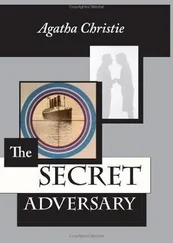‘But your sympathy—’
‘My sympathy is with James Graham and Miss Mollie. I’ve always felt strongly that money shouldn’t be left away from the family to an outsider. I daresay there might be some sort of case that Miss Lawson obtained an ascendency over Miss Wheeler owing to spiritualistic tomfoolery—but I doubt if there’s anything that you could take into court. Only run yourself in for terrific expense. Avoid the law, wherever you can, is my motto. And certainly medically I can’t help you. Miss Wheeler’s mind was perfectly clear.’
He shook hands with us and we passed out into the sunlight.
‘Well!’ I said. ‘That was rather unexpected!’
‘Truly. We begin to learn a little about my correspondent. She has at least two relatives—James Graham and a girl called Mollie. They ought to have inherited her money but did not do so. By a will clearly not made very long ago, the whole amount has gone to the companion, Miss Lawson. There is also a very significant mention of spiritualism.’
‘You think that significant?’
‘Obviously. A credulous old lady—the spirits tell her to leave her money to a particular person—she obeys. Something of that kind occurs to one as a possibility, does it not?’
iv
We had arrived at The Laburnums. It was a fair sized Georgian house, standing a little way back from the street with a large garden behind. There was a board stuck up with For Sale on it.
Poirot rang the bell. His efforts were rewarded by a fierce barking within. Presently the door was opened by a neat middle-aged woman who held a barking wire-haired terrier by the collar.
‘Good afternoon,’ said Poirot. ‘The house is for sale, I understand, so Mr James Graham told me.’
‘Oh! yes, sir. You would like to see over it?’
‘If you please.’
‘You needn’t be afraid of Bob, sir. He barks if anyone comes to the door, but he’s as gentle as a lamb really.’
True enough, as soon as we were inside, the terrier jumped up and licked our hands. We were shown over the house—pathetic as an empty house always is, with the marks of pictures showing on the walls, and the bare uncarpeted floors. We found the woman only too ready and willing to talk to friends of the family as she supposed us to be. By his mention of James Graham, Poirot created this impression very cleverly.
Ellen, for such was our guide’s name, had clearly been very attached to her late mistress. She entered with the gusto of her class into a description of her illness and death.
‘Taken sudden she was. And suffered! Poor dear! Delirious at the end. All sorts of queer things she’d say. How long was it? Well, it must have been three days from the time she was took bad. But poor dear, she’d suffered for many years on and off. Jaundice last year she had—and her food never agreed with her well. She’d take digestion tablets after nearly every meal. Oh! yes, she suffered a good deal one way or another. Sleeplessness for one thing. Used to get up and walk about the house at night, she did, her eyesight being too bad for much reading.’
It was at this point that Poirot produced from his pocket the letter. He held it out to her.
‘Do you recognise this by any chance?’ he asked.
He was watching her narrowly. She gave an exclamation of surprise.
‘Well, now, I do declare! And is it you that’s the gentleman it’s written to?’
Poirot nodded.
‘Tell me how you came to post it to me?’ he said.
‘Well, sir, I didn’t know what to do—and that’s the truth. When the furniture was all cleared out, Miss Lawson she gave me several little odds and ends that had been the mistress’s. And among them was a mother of pearl blotter that I’d always admired. I put it by in a drawer, and it was only yesterday that I took it out and was putting new blotting paper in it when I found this letter slipped inside the pocket. It was the mistress’s handwriting and I saw as she’d meant to post it and slipped it in there and forgot—which was the kind of thing she did many a time, poor dear. Absentminded as you might say. Well, I didn’t know what to do. I didn’t like to put it in the fire and I couldn’t take it upon myself to open it and I didn’t see as it was any business of Miss Lawson’s, so I just put a stamp on it and ran out to the post box and posted it.’
Ellen paused for breath and the terrier uttered a sharp staccato bark. It was so peremptory in sound that Poirot’s attention was momentarily diverted. He looked down at the dog who was sitting with his nose lifted entreatingly towards the empty mantelpiece of the drawing-room where we were at the time.
‘But what is it that he regards so fixedly?’ asked Poirot.
Ellen laughed.
‘It’s his ball, sir. It used to be put in ajar on the mantelpiece and he thinks it ought somehow or other to be there still.’
‘I see,’ said Poirot. ‘His ball…’ He remained thoughtful for a moment or two.
‘Tell me,’ he said. ‘Did your mistress ever mention to you something about the dog and his ball? Something that perturbed her greatly?’
‘Now it’s odd your saying that, sir. She never said anything about a ball, but I do believe there was something about Bob here that was on her mind—for she tried to say something just as she was dying. “The dog,” she said. “The dog—” and then something about a picture ajar—nothing that made sense but there, poor soul, she was delirious and didn’t know what she was saying.’
‘You will comprehend,’ said Poirot, ‘that this letter not reaching me when it should have done, I am greatly intrigued about many things and much in the dark. There are several questions that I should wish to ask.’
By this time Ellen would have taken for granted any statement that Poirot had chosen to make. We adjourned to her somewhat overcrowded sitting-room and having pacified Bob by giving him the desired ball which he retired under a table to chew, Poirot began his interrogations.
‘First of all,’ he said, ‘I comprehend that Miss Wheeler’s nearest relations were only two in number?’
‘That’s right, sir. Mr James—Mr James Graham whom you mentioned just now—and Miss Davidson. They were first cousins and niece and nephew to Miss Wheeler. There were five Miss Wheelers, you see, and only two of them married.’
‘And Miss Lawson was no relation at all?’
‘No, indeed—nothing but a paid companion.’
Scorn was uppermost in Ellen’s voice.
‘Did you like Miss Lawson, Ellen?’
‘Well, sir, she wasn’t one you could dislike, so to speak. Neither one thing nor the other, she wasn’t, a poor sort of creature, and full of nonsense about spirits. Used to sit in the dark, they did, she and Miss Wheeler and the two Miss Pyms. A sayance, they called it. Why they were at it the very night she was taken bad. And if you ask me, it was that wicked nonsense that made Miss Wheeler leave her money away from her own flesh and blood.’
‘When exactly did she make the new will? But perhaps you do not know that.’
‘Oh! yes, I do. Sent for the lawyer she did while she was still laid up.’
‘Laid up?’
‘Yes, sir—from a fall she had. Down the stairs. Bob here had left his ball on top of the stairs and she slipped on it and fell. In the night it was. As I tell you, she used to get up and walk about.’
‘Who was in the house at the time?’
‘Mr James and Miss Mollie were here for the weekend. Easter it was, and it was the night of Bank Holiday. There was cook and me and Miss Lawson and Mr James and Miss Mollie and what with the fall and the scream we all came out. Cut her head, she did, and strained her back. She had to lie up for nearly a week. Yes, she was still in bed—it was the following Friday—when she sent for Mr Halliday. And the gardener had to come in and witness it, because for some reason I couldn’t on account of her having remembered me in it, and cook alone wasn’t enough.’
Читать дальше
Конец ознакомительного отрывка
Купить книгу












